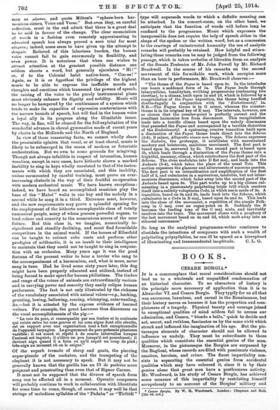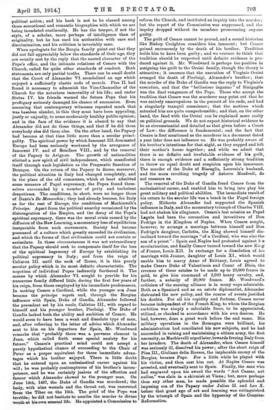BOOKS.
CESARE BORGIA.*
IT is a commonplace that moral considerations should not lead us to a wholesale and unqualified condemnation of an historical character. To no characters of history is the principle more necessary of application than it is to Alexander VI. and Cesare Borgia. They typify for us all that was enormous, luxurious, and carnal in the Renaissance, but their history moves us because it has the proportion and com- pleteness of a tragedy. Physical beauty and courage joined to exceptional qualities of mind seldom fail to arouse our admiration, and Cesare, " biondo e Bello," quick to decide and act, secret, and ruthless, fascinates us by the same virtu which struck and inflamed the imagination of his age. But the pic- turesque elements of character should not be allowed to influence us unduly. They must be subordinate to those qualities which constitute the essential genius of the man. Moreover, in the picturesque the Borgias are surpassed by the Baglioni, whose records are filled with passionate violence, emotion, heroism, and crime. The finest impartiality con- sists in separating the essential genius from accidental qualities which may have coloured it, since it is by their genius alone that great men have a posthumous activity. Mr. Woodward, in his study of Cesare Borgia, has achieved some measure of this impartiality by restricting himself scrupulously to an account of the Borgias' military and • Cesare Borgia. By W. H. Woodward. London Chapman and Hall. [12s. Cid. net.]
political action ; and his book is not to bo classed among those sensational and romantic biographies with which we are being inundated continually. He has the temper, if not the style, of a scholar, more perhaps of intelligence than of originality, but he has used his authorities with care and discrimination, and his criticism is invariably sane.
When apologists for the Borgia family point out that they did not fall appreciably below the standards of their age, they are usually met by the reply that the sacred character of the Pope's office, and the intimate relations of Cesare with the Church, called for quite other standards of conduct. Both statements are only partial truths. There can be small doubt that the Court of Alexander VI. scandalized an age which enjoyed a sufficiently elastic code of morals. Pius IL had found it necessary to admonish the Vice-Chancellor of the Church for the notorious immorality of his life; and under .Sixtus IV. his friends warned the future Pope that his profligacy seriously damaged his chance of succession. Even assuming that contemporary witnesses repeated much that was baseless slander, in this they must have been appealing, justly or unjustly, to some moderately healthy public opinion; and in the face of the evidence it is absurd to say that Alexander did not do these things, and that if he did them everybody else did them also. On the other hand, the Papacy bad become at that time little more than a secular princi- pality. The spiritual power by which Innocent III. dominated Europe had been seriously weakened by the •arrogance of Innocent IV. and of Boniface VIII., and by the removal of the Papacy to Avignon. The growth of nationalities elicited a new spirit of civil independence, which manifested itself through such legislation as the Pragmatic Sanction of Bourgea. On the return of the Papacy to Rome, moreover, the political situation in Italy had changed completely, and in the place of the old communes, •which at least admitted some measure of Papal supremacy, the Popes found them- selves surrounded by a number of petty and turbulent -despotism& The oonditions, in short, were no longer• those of Dante's De Monarchic; they had already become, for Italy as for the rest of Europe, the conditions of Machiavelli's Principe. Apart from the political anarchy occasioned by the disintegration of the Empire, and the decay of the Pope's spiritual supremacy, there was the moral crisis caused by the diffusion of the New Learning, a momentary loss of equilibrium inseparable from such movements. Society had become possessed of a culture which greatly exceeded its civilization, and which the forms of that civilization could not contain or assimilate. In these circumstances it was not extraordinary that the Papacy should seek to compensate itself for the loss of the spiritual hegemony of Europe by establishing its political supremacy in Italy ; and from the reign of Calixtus III. until the sack of Rome, it is this purely secular policy avhich is its most, definite characteristic. The nepotism of individual Popes indirectly furthered it. The means by which Alexander VI. sought to provide for his numerous family differed little, during the first few years of his reign, from those employed by his immediate predecessors. In making Cesare a Cardinal, while the younger son Juan became the principe nepote and, through the Borgian influence with Spain, Duke of Gandia, Alexander followed the precedent set by his uncle, Calixtus IIL, with regard to himself and his younger brother, Pierluigi. The Duke of Gandia lacked both the ability and ambition of Cesare. He would seem to have been a weak and dissolute type of man, and, after referring to the letter of advice which Alexander sent to him on his departure for Spain, Mr. Woodward remarks that "probably there -was a perverse element in Juan, which called forth some special anxiety for his future." Cesare's practical mind could not accept a purely hypothetical chance of succeeding to the Chair of Peter as a proper equivalent for those immediate advan- tages which his brother enjoyed. There is little doubt that he entered upon an ecclesiastical career against his will ; he was probably contemptuous of his brother's incom- petence, and he was certainly jealous of the affection and favour which Alexander showed to the younger man. On June 14th, 1497, the Duke of Gandia was murdered; the body, with nine wounds and the throat cut, was recovered from the Tiber on the 16th. The grief of the Popo was terrible; he did not hesitate to asor•ibe the murder to divine wrath at hisown sensual life. He-appointed a Commission to
reform the Church, and instituted an inquiry into the murder; but the report of the Commission was suppressed, and the inquiry dropped without its members pronouncing anyone guilty.
The guilt of Cesare cannot be proved, and a sound historian like Bishop Creighton considers him innocent; but Cesare gained enormously by the death of his brothel.. Tradition holds him to have been guilty ; and we venture to think that tradition should be respected until definite evidence is pro- duced against it. Mr. Woodward is perhaps too positive in assigning the guilt to the Orsini family, though the theory is attractive ; it assumes that the execution of Virginio Orsini avenged the death of Pierluigi, Alexander's brother ; that the murder of the. Duke of Gandia was the reply to Virginio'a execution, and that the " bellissimo inganno " of Sinigaglia was the final vengeance of the Pope. Those who accept the tradition that Cesare was the murderer may point out that he was entirely unscrupulous in the pursuit of his ends, and bad a singularly tranquil conscience; that the motives which actuated him are quite comprehensible; and that, on the other hand, the feud with the Orsini can be explained more easily on political grounds. We do not expect historical evidence to be as circumstantial and detailed as that given before a Court of Law : the difference is fundamental; and the fact that Cesare is first mentioned as the murderer in a document dated a year later does not influence us. He was probably aware of his brother's intentions for that night, as they supped and left their mother's house together ; and while we admit that there is no definite and irrefutable evidence of his guilt, there is enough evidence and a sufficiently strong tradition to throw an equal doubt and suspicion upon his innocence. The murder of the Duke of Bisceglia, Lucrezia's husband, and the more revolting tragedy of Aetorre Manfredi, do not reassure us.
The removal of the Duke of Gandhi, freed Cesare from the ecclesiastical career, and enabled him to bring into play his great military and political abilities. The immediate result of his return to the secular life was a break in the Papal foreign policy. Hitherto Alexander had supported the Spanish influence in Italy, and the momentary triumph of Charles VIII. had not shaken his allegiance. Cesare's last mission as Papal Legate bad been the coronation and investiture of Don Fedrigo in the Kingdom of Naples. When Cesare sought, however, to arrange a marriage between himself and Don Fedrigo's daughter, Carlotta, the King showed himself dis- inclined toward the marriage "of a Cardinal, who was also the son of a priest " : Spain and Naples had protested against h s secularization, and finally Cesare turned toward the new Kir g of France, Louis XII. In exchange for a dissolution of .his marriage with Jeanne, daughter of Louis XL, which would enable him to marry Anne of Brittany, Louis agreed to drake Cesare Duke of Valentinois and Count of Dioie, the revenue of these estates to be made up to 20,000 francs in gold, to give him command of 2,000 heavy cavalry, and, further, a subsidy of 20,000 francs. Mr. Woodward's criticism of the ensuing alliance is in many ways admirable. Both as a Spaniard and as an astute diplomatist, Alexander distrusted the new policy, and the course of events justified his doubts. For all his rapidity and fortune, Cesare never became independent of the French King, to whom the Borgian ambition was simply a calculable force, to be appreciated, utilized, or checked in accordance with his own desires. He had, however, done a great work before the end came. His military operations in the Romagna were brilliant, his administration had conciliated his new subjects, and he had succeeded in raising and maintaining a citizen army, the first necessity, as Machiavelli urged later, towards freeing Italy from her invaders. The death of Alexander, when Cesare himself was seriously ill, dissolved his power ; after the short reign of Pius III., Giuliano dells Revere, the implacable enemy of the Bor•gias, became Pope. For a little while he played with his victim, and then cast him out. At Naples Cesare was arrested, and eventually sent to Spain. Finally, the man who had engraved upon his sword the words "Aid Caesar, aut minus," was slain in a skirmish at Viana ; but, more perhaps than any other man, he made possible the splendid and imposing era of the Papacy under Julius IL and Leo X. before that great age of art and learning was extinguished by the triumph of Spain and the hypocrisy of the Counter. Reformation.



























































 Previous page
Previous page